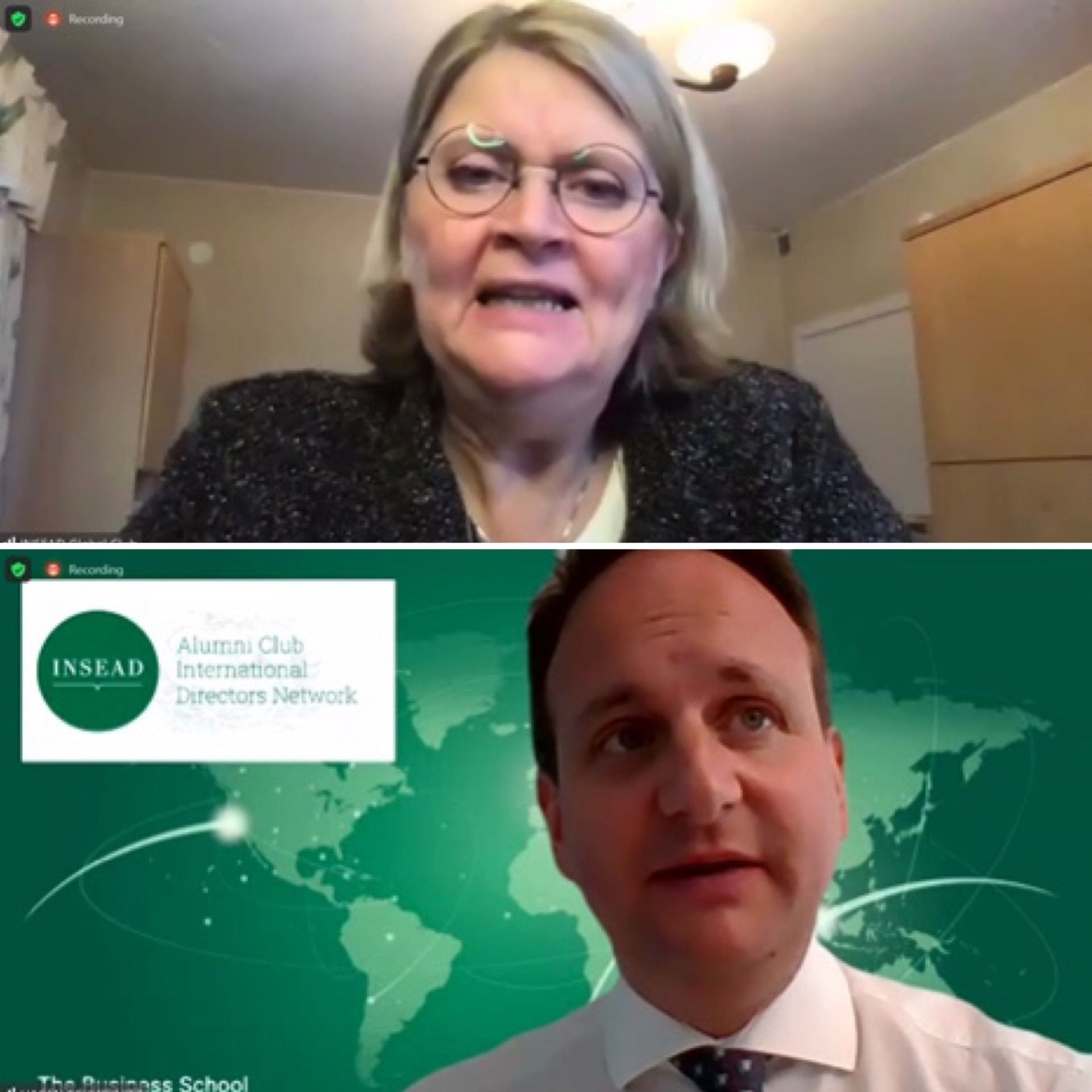By Karen Loon, IDN Board Member and Non-Executive Director
With climate challenges increasing, the board has a responsibility to assess the impact and define strategies to handle the risk. Are we as board members doing enough? Do we understand how to address the topic? What are the challenges and opportunities here?
INSEAD Directors Network (“IDN”) members had the opportunity to listen to Lise Kingo, IDP-C, NED and former executive director at UN Compact and Novo Nordisk, Stig P Christensen, IDP-C and NED, and Silvio Dulinsky, Head of Business Engagement Latin America, World Economic Forum held on 18 November 2020 in an exclusive webinar for members which was facilitated by IDN Board Member, Liselotte Engstam based in Sweden with Q&A support from Hagen Schweinitz, a fellow IDN Board Member based in Germany.
Top left – Lise Kingo, Top right – Silvio Dulinsky. Bottom – Stig P Christensen
In their introductory remarks, the panellists covered three areas:
Responsible business is now a board and senior management agenda however climate and social inequality remains far behind
The Sustainable Development Goals were issued out five years ago. Whilst there is much broader recognition that responsible business is now a key board and senior management agenda topic, after five years, we are still very far behind in the whole climate area and also social inequality.
Due to the huge gap and climate emergency across the globe, the whole area of climate change has developed and is now one of the most mature areas in relation to how companies can control, manage and set good risk and targets. In particular, the financial community has put climate risk as a key priority through how they are setting targets. Another recent initiative is that investors want to know how companies put climate risk costs into their accounts.
Climate will continue to stay on the board and management agenda. However, companies need to develop more holistic approaches to running their businesses when it comes to ensuring a successful transition to a net-zero economy. There are a number of tools and initiatives in place to support board members in this process, which means there’s no reason for boards not to stat working on a transition strategy.
We are beyond a tipping point in relation to climate.
- We are beyond a tipping point – We have no time to waste. Policy-makers and business leaders have to their best to rapidly implement new ways forward, as younger generations are demanding. Investors are increasingly more supportive of these changes.
- Green and digital is core business – There is currently a risk for boards to get stuck on the compliance and risk agenda and not address opportunity agenda. It is often hard for boards to have strong and precise discussions and evaluation of the opportunity side. Boards should push this agenda beyond climate. The way forward requires innovation of the regulatory framework which is currently work-in-progress.
- Open the windows and doors – Look outside beyond the borders of your company and M&A objectives you are facing with a systems lens on. Create symbiosis between different companies and sectors.
- Listen to the crowds – They can’t be on the boards, but they have to be heard by the company.
Tools are available to support boards. A value chain approach should be adopted.
Tools are available to support boards in relation to setting up effective Climate Governance. Specifically, there are eight climate principles outlined in the World Economic Forum White Paper “How to Set Up Effective Climate Governance on Corporate Boards – Guiding principles and questions”. These are:
- Principle 1 – Climate accountability on boards
- Principle 2 – Command of the subject; boards need the knowledge to debate and stay informed re climate related decisions.
- Principle 3 – Board structure; the board structure needs to be effective to embed climate in the decision-making processes of the board and senior management.
- Principle 4 – Material risk and opportunity assessment; management should assess and manage short, medium and long term climate related risks and opportunities.
- Principle 5 – Strategic integration; management should integrate climate considerations into their strategic and financial planning of the company
- Principle 6 – Incentivisation
- Principle 7 – Reporting and disclosure; reporting and disclosure should be undertaken with the same rigour as a financial report.
- Principle 8 – Exchange; engage peers, regulators, investors and the whole value chain in the process.
All companies, including SMEs are crucial in relation to transforming value chains. The role of the board is to support the broader value chain changes required.
A challenge is how can we bring on board others who are not yet convinced on the importance of the issue. The Chair and CEO as well as a critical mass of directors play a critical role to put climate on the agenda of the board to support driving the change.
Top – Liselotte Engstam. Bottom – Hagen Schweinitz
Following the opening remarks, the panellists and IDN members engaged in lively discussion in relation to topics including:
- The importance of getting climate on the board agenda.
- Being proactive on climate before rules becoming mandatory. Global requirements on climate are increasing rapidly.
- Leadership agenda – Set goals which are not only financial, but also deal with other areas including climate, diversity etc. to drive the change agenda. The importance of the role of the board to drive this.
- The increasing focus on climate being placed by investors in more recent times.
- How do boards look at the risks and opportunities in relation to climate?
- Sustainability reporting including accountability, accounting and valuation considerations.
- Directors’ fiduciary duties in relation to climate.
As Liselotte Engstam concluded:
“There’s no question that we need to have increased focus from board directors, and it also needs to be more inclusive and holistic, and we are getting much more attention from investors… Don’t just look at this as negative it’s a fantastic time especially now to look at (it as) a source such as an opportunity to rethink and re-set”.
The next exclusive IDN webinar will be on Getting your First Board Mandate which will be held on 1 December 2020 at 1200 – 1300 CET.


